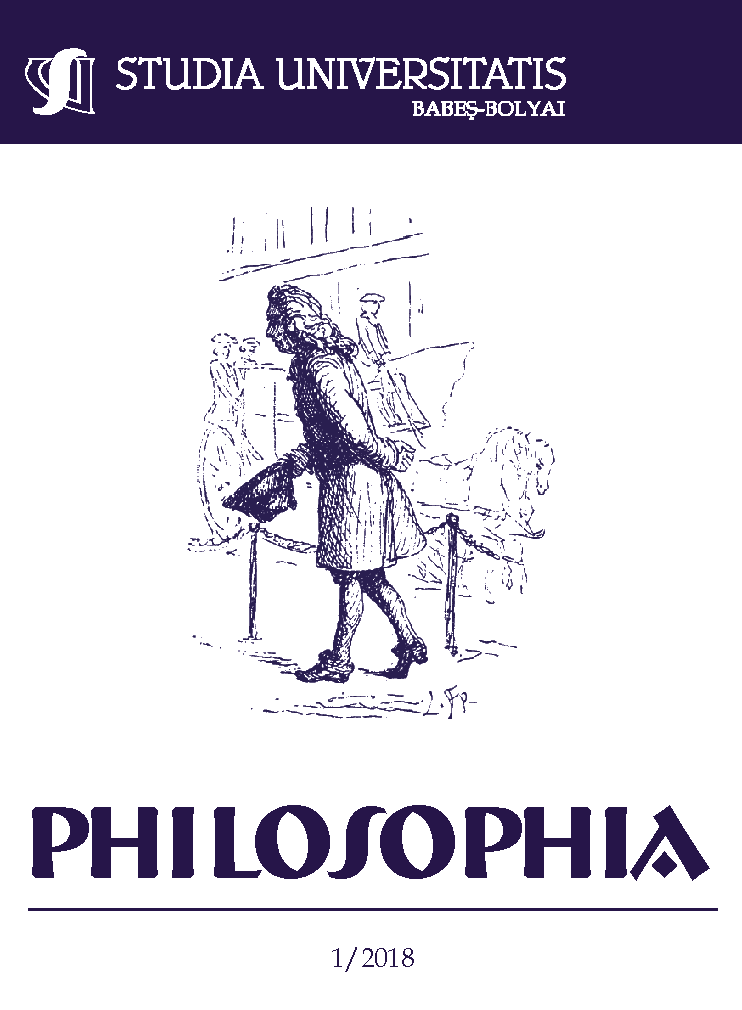IS INTENTIONALITY A BETTER CONCEPT THAN TELEOLOGY TO DESCRIBE BIOLOGICAL INDIVIDUAL BEHAVIOR?
DOI:
https://doi.org/10.24193/subbphil.2018.1.02Keywords:
Autopoiesis, cognition, intentionality, machine, teleologyAbstract
The author proposes that the phenomenological concept of intentionality is consistent with the idea that the living organism is structurally coupled with its environment, as stated by the theory of Autopoiesis of Humberto Maturana and Francisco Varela. This theory affirms that living organisms produce themselves as systems in response to the disturbances they experience in their environments, and takes their responses as primordial cognitive acts. It is argued that their responses are intentional since they are elemental ways of standing in a world. In the first part, it is explained what Autopoiesis is, how cognition works in living organisms, and what structural coupling is. In the second part, it is stated that living organisms cannot be understood in mechanistic terms since they respond to a teleology inherent to intentional beings. In the last part, it is discussed how structural coupling and intentionality are analogous, and why intentionality is more comprehensive concept than teleology to describe the structure of individual organisms.
References
Barbaras, Renaud, “The Phenomenology of life: desire as the being of the subject”, in Zahavi, Dan Ed., The Oxford Handbook of Contemporary Phenomenology, Oxford University Press, 2014.
Capra, F. and Luisi, P. L., The Systems View of Life. A Unifying Vision, Cambridge University Press, 2014.
Candiloro, Hernán, “Pobreza, vida y animalidad en el pensamiento de Heidegger”, in Areté, Revista de Filosofía XXIV (2), 2012, 263‐287.
Escuderó, Jesús Adrián, Introducción a “Husserl, Edmund La idea de la fenomenología”, in Husserl, Edmund, La idea de la fenomenología, Herder, 2011.
Gallagher, Shaun & D. Zahavi, The Phenomenological Mind: An Introduction to the Philosophy of Mind and Cognitive Sciences. Routledge, Taylor & Francis, 2008.
Giurfa, M., Zhang, S. W., Jenett, A., Menzel, R. & Srinivasan, M. V., “The concepts of 'sameness' and 'difference' in an insect”, in Nature, 410, 2001, 930‐933.
Engel, Andreas, “Why Cognitive Neuroscience Should Adopt a ‘Pragmatic Stance’?”, in Newen, A., Bartels, A. and Jung, E. Eds., Knowledge and representation, Stanford Center for the Study of Language and Information, 2001, 211‐233.
Heidegger, Martín, Fundamental concepts of metaphysics: World, finitude, solitude. Indiana University Press, 1995.
Husserl, Edmund, Ideas pertaining to a pure phenomenology and to a phenomenological philosophy. First book: General introduction to a pure phenomenology, part 1. Martinus Nijhoff, 1983.
The Crisis of European Sciences and Transcendental Phenomenology: An Introduction to Phenomenological Philosophy, Northwestern University Press, 1970.
Jacobs, D.S. and Bastian, A, Predator‐Prey Interactions: Co‐evolution between Bats and Their Prey, Springer, 2016.
Kern, Iso, “Die drei Wege zur transzendental‐phänomenologischen Reduktion in der Philosophie Edmund Husserl”, in Tijdschrift vor Philosophie, 24/2, 1962, 303‐349.
Kriegel, Uriah, “Is Intentionality dependent upon Consciousness?”, in Philosophical Studies 116, 2003, 271‐307.
Letelier, J. C., Marín, G., y Mpodoliz, J., “Autopoietic and (M, R) systems”, in Journal of Theoretical Biology 222, 2003, 261‐272.
Levinas, Emmanuel, Totalidad e infinito, Sígueme, 2012.
En découvrant l’existence avec Husserl et Heidegger, Vrin, 2010.
De la existencia al existente, Arena Libros, 2006.
De otro modo que ser o más allá de la esencia, Sígueme, 2003.
Marder, Michael, “What is Plant‐Thinking?”, in Klesis, revue philosophique 25, 2013, 124‐143.
Maturana, Humberto, “Autopoiesis, Structural Coupling and Cognition: A history of these and other notions in the biology of cognition”, in Cybernetics & Human Knowing, vol. 9 (3‐4), 2002, 5‐34.
“The organization of the Living: A theory of the Living Organization”, in Int. J. Human‐Computer Studies, 51, 1974, 149‐168.
Maturana, H. & Varela, F. (1980). Autopoiesis and Cognition: The organization of the living. Boston, Dordrecht, London: Kluwer.
Rizo‐Patrón, Rosemary, “Constitución teleológica de la identidad: del instinto a la razón”, in Actas de las Undécimas Jornadas Peruanas de Fenomenología y Hermenéutica, PUCP, 2015.
Husserl en diálogo: Lecturas y debates, Siglo del Hombre Editores, PUCP, 2012.
Rosas, Alejandro, “Kant y la ciencia natural de los organismos”, in Ideas y valores 138, 2008, 5‐23.
Rosen, Robert, Life Itself: A Comprehensive Inquiry into the Nature, Origin, and Fabrication of Life, Columbia University Press, 1991.
Searle, John, Intentionality. An essay in the philosophy of mind, Cambridge University Press, 1983. “Consciousness, Unconsciousness and Intentionality”, in Philosophical Issues, 1, 1991, 45‐66.
Thompson, E., Mind in Life: Biology, Phenomenology, and the Sciences of Mind. Massachusetts: Harvard University Press, 2007.
Varela, Francisco J., “Autopoiesis and a Biology of intentionality”, in B. McMullin y N. Murphy Eds., Autopoiesis & Perception, Proceedings of a workshop held in Dublin City University, August 25th & 26th, School of Electronic Engineering Technical Report, 1992, 1‐14.
Varela, Francisco J., Thompson, Evan and Rosch, Eleanor, The Embodied Mind: Cognitive Science and Human Experience, MIT, 1993.
Weber, Andreas and Varela, Francisco, “Life after Kant: Natural purposes and the autopoietic foundation of biological individuality”, in Phenomenology and the Cognitive Sciences, 1, 2002 97‐125.
Zahavi, Dan, “Thin, thinner, thinnest: Defining the minimal self”, in C. Durt, C. Fuchs y Tewes Eds., Embodiment, Enaction and Culture: Investigating the Constitution of the Shared World, MIT Press, 2017.
“Introduction: Subjectivity in the center or back to basis”, in Phenomenology and the Cognitive Sciences, 3, 2004, 229‐334.
“Inner Time‐Consciousness and Pre‐Reflective Self‐awareness”, in Welton, Don Ed., The New Husserl: A Critical Reader, Indiana University Press, 2003a, 157‐180.
Husserl’s Phenomenology, Stanford University Press, 2003b.
Downloads
Published
How to Cite
Issue
Section
License
Copyright (c) 2018 Studia Universitatis Babeș-Bolyai Philosophia

This work is licensed under a Creative Commons Attribution-NonCommercial-NoDerivatives 4.0 International License.





